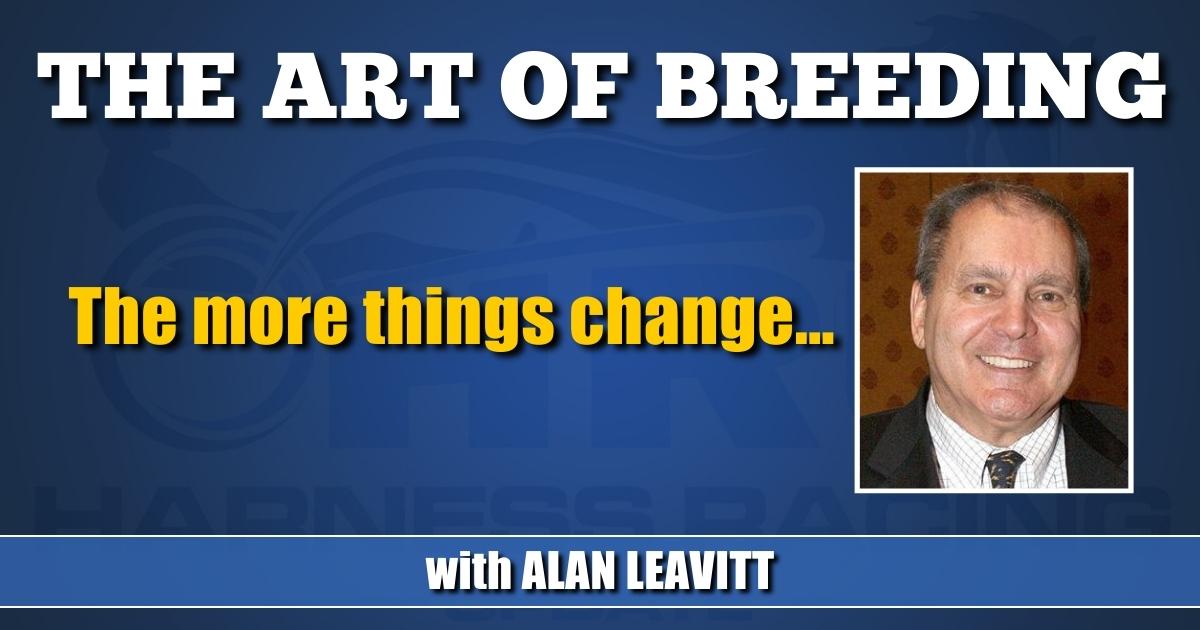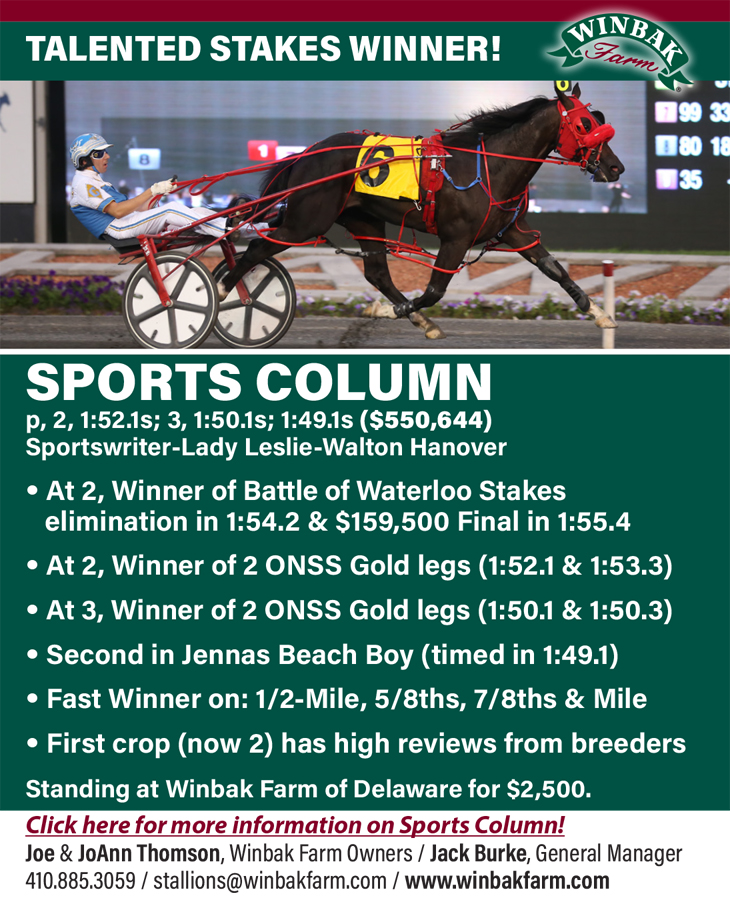The more things change…
by Alan Leavitt
The French are right: “Le plus ça change, le plus c’est la meme.” The more things change, the more they stay the same.
That was exactly the case on Hambletonian day at The Meadowlands. The transplanted Swedish horsemen showed their clout in both the stakes for 2-year-old trotters. Kilmister won the $337,000 Peter Haughton for Marcus Melander over his stablemate, Oh Well, and Instagram Model took the $335,000 Jim Doherty for 2-year-old trotting fillies.
But the two big dances went to the eccentrically hatted Jim Campbell, an Ontario native and long-time New Jersey resident. His longshot gelding Cool Papa Bell got a one-in-a-million drive from Todd McCarthy to win the Hambletonian, and his Fashion Schooner was sharp as a knife to win the Oaks.
So if you’re trying to make a decision about a trotting trainer, the answer is you won’t go wrong with either choice, North American or Swedish American. No one group or nationality has an exclusive on good horsemen.
What Hambletonian day also crystallized was the dominance of trotting sire Chapter Seven. If I had my druthers, I’d wish a less fraught name for such a great horse, but maybe a rose by any other name would actually smell just as sweet.
I do take some pride in Chapter Seven’s pedigree, as his tail male (or top line) grandsire is Conway Hall, whom my wife Meg and I bred. His great grandsire is Garland Lobell, bred by yours truly, and on back to Noble Victory, the first million dollar standardbred when I syndicated him in 1964, better known as the Ming Dynasty.
Like a lot of trotters today, Chapter Seven has no close crosses in his pedigree. His first four generations have no duplicate names, making him technically an Outcross.
In case you forgot, when the sum of the generations in which the same name appears twice is six or less, that is defined as Inbreeding.
When the sum of the generations in which the same name appears twice is seven or eight, that is defined as Line Breeding.
When there is no common name that appears twice in the first four generations, that is technically defined as an Outcross.
Chapter Seven is an outcross, as are a great majority of the American Trotting breed today. What this means is there is no danger lurking ahead in the form of compromised stallion fertility, such as we experienced some 30 years ago.
What we lived through then was the result of inbreeding to the extent that the American trotter lost 17 per cent of its heterozygosity, or the variability factor. The first manifestation of that condition is the loss of stallion fertility, as all of us who struggled with sons and grandsons vividly remember.
Not only does Chapter Seven have a totally Outcross pedigree, so does his fast, gelding son Cool Papa Bell. (In case you don’t know your baseball, James Thomas Bell, aka Cool Papa, was a star of the Negro Baseball League. Because of his color, he never played in organized, white baseball. In 1974, he was elected to the Baseball Hall of Fame.)
Forgive a personal note here. I was thrilled for Todd McCarthy, a new friend, who maybe will do a redux next year with a colt I’m close to.
Cool Papa Bell’s pedigree has no close crosses whatever, except for the influence of another great ball player, Charlie Keller. Two of the granddams on both sides of his pedigree go straight back to their granddam, Yankee Duchess.
Yankee Duchess is a daughter of China L, the first mare Keller ever bought. He paid $1,600 for her at one of Joe Eyler’s auctions at Thurmont, MD. Eyler got Keller into our business after the latter retired from baseball.
China L was a great bred mare whom Eyler had begged into the sale from an understanding executor of the W. N. Reynolds Estate. Keller could not only have bought his foundation mare that afternoon, he could have also bought a push lawn mower, a bicycle sans hub caps, and several bags rumored to contain dog food, with nothing guaranteed.
When Joe Eyler put on a sale, there was something for everyone. Although it was not exactly last week, I still remember it well because I was standing close to Keller and Jim Harrison when he bought his new vocation.
Finally, I ask an indulgence. I was watching Hambletonian Day on RTN, and during the warm-ups for the big dance, the camera at one point fastened on Tim Tetrick and Rebuff.
As a horseman, I can instantly spot a pair of good hands, as Tetrick is blessed with. The camera caught him barely tightening the lines, starting from a walk, and then stayed with the two of them as Rebuff effortlessly changed gears a he hit his full stride.
And what I saw then was something of incredible beauty. Rebuff was trotting the way every horseman’s dream horse trots. So it doesn’t matter to me that Rebuff didn’t get any money in the race that counts more than any other race. Just as it won’t matter to this kid if he doesn’t win another race in his life.
I’m saying right here and now that Rebuff is going to be the world’s next great trotting sire. And if I happen to be wrong, feel free to tell me so, assuming you’re able to find me, which by then I seriously doubt, but good luck trying.

















